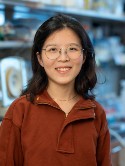Fragment-based drug nanoaggregation reveals drivers of self-assembly Journal Article
| Authors: | Chen, C.; Wu, Y.; Wang, S. T.; Berisha, N.; Manzari, M. T.; Vogt, K.; Gang, O.; Heller, D. A. |
| Article Title: | Fragment-based drug nanoaggregation reveals drivers of self-assembly |
| Abstract: | Drug nanoaggregates are particles that can deleteriously cause false positive results during drug screening efforts, but alternatively, they may be used to improve pharmacokinetics when developed for drug delivery purposes. The structural features of molecules that drive nanoaggregate formation remain elusive, however, and the prediction of intracellular aggregation and rational design of nanoaggregate-based carriers are still challenging. We investigate nanoaggregate self-assembly mechanisms using small molecule fragments to identify the critical molecular forces that contribute to self-assembly. We find that aromatic groups and hydrogen bond acceptors/donors are essential for nanoaggregate formation, suggesting that both π-π stacking and hydrogen bonding are drivers of nanoaggregation. We apply structure-assembly-relationship analysis to the drug sorafenib and discover that nanoaggregate formation can be predicted entirely using drug fragment substructures. We also find that drug nanoaggregates are stabilized in an amorphous core-shell structure. These findings demonstrate that rational design can address intracellular aggregation and pharmacologic/delivery challenges in conventional and fragment-based drug development processes. © 2023, The Author(s). |
| Keywords: | unclassified drug; sorafenib; molecular dynamics; drug structure; drug development; molecular analysis; nanoparticle; hydrogen bond; chemical structure; drug stability; chemical modification; hydrogen; aromatic compound; pharmaceutical preparations; chemical bonding; molecular dynamics simulation; drug; hydrophobicity; indocyanine green; article; nanocrystal; biphenyl; nanoaggregate; drug nanoaggregation |
| Journal Title: | Nature Communications |
| Volume: | 14 |
| ISSN: | 2041-1723 |
| Publisher: | Nature Publishing Group |
| Date Published: | 2023-12-14 |
| Start Page: | 8340 |
| Language: | English |
| DOI: | 10.1038/s41467-023-43560-0 |
| PUBMED: | 38097573 |
| PROVIDER: | scopus |
| PMCID: | PMC10721832 |
| DOI/URL: | |
| Notes: | Article -- MSK Cancer Center Support Grant (P30 CA008748) acknowledged in PubMed and PDF -- MSK corresponding author is Daniel Heller -- Source: Scopus |
Altmetric
Citation Impact
BMJ Impact Analytics
Related MSK Work









